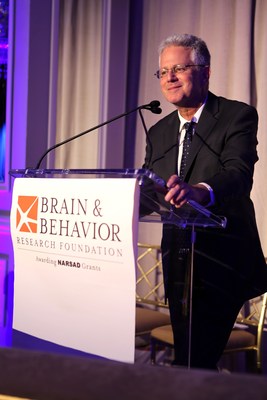|
30.10.2017 19:00:00
|
Brain & Behavior Research Foundation Honors Nine Scientists for Outstanding Achievements in Psychiatric Research at 30th Annual Dinner
NEW YORK, Oct. 30, 2017 /PRNewswire-USNewswire/ -- The Brain & Behavior Research Foundation honored nine scientists with its 2017 Outstanding Achievement Prizes for their work in schizophrenia, mood disorders, child and adolescent psychiatry, and cognitive neuroscience. The award presentation took place on Friday, October 27th at the Foundation's International Awards Dinner and 30th Anniversary Celebration, honoring the transformative power of neuroscience and psychiatric research to improve the lives of people with mental illness, which affects one in five people.

According to Foundation President and CEO Jeffrey Borenstein, M.D., the Outstanding Achievement Prizes, which cover five categories, are among the most prestigious awards in the field of psychiatric research. The recipients were selected by the Foundation's Scientific Council, comprised of 177 leading experts across disciplines in brain and behavior research, including two Nobel Prizewinners; two former directors and the current director of the National Institute of Mental Health (NIMH); four recipients of the National Medal of Science; 13 members of the National Academy of Sciences; 27 chairs of psychiatry and neuroscience departments at leading medical institutions; and 52 members of the Institute of Medicine.
"These scientists have dedicated their lives to understanding complex psychiatric conditions to help people with mental illness and their families," says Dr. Borenstein. "We are proud to honor them and highlight their inspiring work."
The 2017 Outstanding Achievement Prizewinners are as follows:
The Lieber Prize for Outstanding Achievement in Schizophrenia Research
The Lieber Prize was established in 1987 by the lateConstance and Stephen Lieber to bring public recognition to the outstanding discoveries being made in schizophrenia research.
John M. Davis, M.D.
Gilman Professor of Psychiatry and Research, Professor of Medicine
University of Illinois at Chicago
Dr. Davis conducted the first studies of how anti-psychotic drugs are metabolized in the body and how this process may impact their efficacy and side effects. His early research on the role of the neurotransmitter dopamine in schizophrenia, led to the development of partial dopamine blockers as antipsychotic drugs. He wrote the first science-based textbook on psychopharmacology, and performed the first meta-analysis study in psychiatry, which provided convincing evidence that maintenance antipsychotic, mood stabilizers and antidepressant drugs could help prevent future schizophrenic episodes. Dr. Davis currently studies gene expression abnormalities in schizophrenia and conducts clinical trials addressing the disease.
The Maltz Prize for Innovative & Promising Schizophrenia Research
Established in 2004, the prize was renamed in 2016in honor of Board MembersMilton and Tamar Maltz. The Maltz Prize is awarded to an investigatorwho has undertaken innovative and promising research in schizophrenia. Winners are selected by the Lieber Prize recipient(s) of the same year.
Deanna L. Kelly, Pharm.D., BCPP
Professor of Psychiatry, University of Maryland School of Medicine, Affiliate Professor, University of Maryland School of Pharmacy; Director, Treatment Research Program, Maryland Psychiatric Research Center; and President, College of Psychiatric and Neurologic Pharmacists (CPNP).
Dr. Kelly's research focuses on treatment-oriented research looking at the biologic differences and side effects of women with schizophrenia. Her work on a large multinational clinical trial looks at the efficacy of clozapine in the treatment of patients of African descent who may have a genetic predisposition to certain side effects. Together with a collaborative team from Johns Hopkins University and Harvard, Dr. Kelly is examining a subgroup of people with schizophrenia with a high degree of inflammation and a unique immune response to gliadin, a protein found in wheat and other foods, to determine whether inflammation and psychiatric symptoms can improve when gluten is removed from the diet.
The Colvin Prize for Outstanding Achievement in Mood Disorders Research
Established in 1993 the prize was re-named in 2012 to honor a Foundation supporter, the lateOliver D. Colvin, Jr., who bequeathed the largest single contribution in the Foundation's history.
Hilary P. Blumberg, M.D.
The John and Hope Furth Endowed Professor of Psychiatric Neuroscience, Professor of Psychiatry, Radiology and Biomedical Imaging, and Faculty in the Child Study Center, Director, Mood Disorders Research Program Yale University School of Medicine.
Dr. Blumberg's research focuses on understanding the causes of bipolar disorder through early detection, intervention, targeted treatments, improved prognosis, and prevention of progression and suicide. She pioneered some of the first demonstrations of differences in the functioning of emotional brain circuitry in individuals while they were experiencing manic or depressive symptoms of bipolar disorder. Her integrative approaches to neuroimaging has shown the negative influences of genetic variations and early life stress, and the salutary influences of pharmacological and non-pharmacological interventions on the structure and function of the brain circuitry. Her pioneering work on the development of brain circuitry in adolescents has shaped the view of bipolar disorder as a disorder of neurodevelopment. Most recently, she has worked on some of the first multi-modality research on the brain circuitry of suicide risk in adolescents and young adults, changes in the brain in bipolar disorder with age later in life, and the effects of psycho-behavioral treatment.
Tadafumi Kato, M.D., Ph.D.
Deputy Director of RIKEN Brain Science Institute Japan
Dr. Kato's work established the role of mitochondrial dysfunction in bipolar disorder. By studying the neurobiology of bipolar disorder, Dr. Kato found that mitochondrial DNA deletions were accumulated in the postmortem brains of bipolar patients. Using mice that accumulated mitochondrial DNA deletions in the brain, Dr. Kato's team found the mice showed recurrent spontaneous depression-like episodes that responded to lithium, and identified a region of the brain involved in these episodes, findings that could be potentially useful for development of mood stabilizers.
Mary L. Phillips M.D., M.D. (Cantab)
Pittsburgh Foundation-Emmerling Endowed Chair in Psychotic Disorders, Professor in Psychiatry and Clinical Translational Science University of Pittsburgh, Western Psychiatric Institute and Clinic. Scientific Council Member; 2005 Independent Investigator.
Dr. Phillips uses neuroimaging techniques to discover functional and structural abnormalities in brain circuits for emotion, regulation and reward processing associated with specific psychiatric disorders. Her research identifies neurodevelopmental trajectories in the circuitries that are associated with the development of psychiatric disorders in youth and infants, and she is working to identify biomarkers that may increase the future risk for these disorders. Her more recent work examines how neuromodulation techniques can target neural biomarkers of mood disorders as a step toward developing new interventions.
The Ruane Prize for Outstanding Achievement in Child and Adolescent Psychiatric Research
The Ruane Prize was initiated in 2000 by philanthropists Joy and William Ruane, and recognizes significant advances in research toward the understanding and treatment of early-onset brain and behavior disorders.
Nathan A. Fox, Ph.D.
Distinguished University Professor Department of Human Development and Quantitative Methodology, Neurosciences and Cognitive Sciences Program, University of Maryland, College Park; 2007 Distinguished Investigator.
In his research on the biological basis of social and emotional behavior, Dr. Fox has developed methods to assess brain activity in infants and young children during tasks designed to elicit a range of emotions. In his research on the temperament of behavior inhibition, a risk factor in the development of social anxiety in children, Dr. Fox focused primarily on cognitive processes, and used behavioral tasks and electrophysiology to assess differences in performance in children, and identify factors that reduce or enhance the likelihood of developing anxiety.
With fellow 2017 Ruane Award recipients Drs. Nelson and Zeanah, Dr. Fox is a Principal Investigator on the Bucharest Early Intervention Project, a longitudinal study that is the only randomized clinical trial of foster care intervention for infants and young children who began life in institutions under conditions of significant psychosocial adversity.
Charles A. Nelson III, Ph.D.
Professor of Pediatrics and Neuroscience, Professor of Psychology in Psychiatry, Harvard Medical School; Professor of Education Harvard Graduate School of Education; and the Richard David Scott Chair in Pediatric Developmental Medicine Research Boston Children's Hospital.
Delving into a long-standing interest on how early experience impacts early brain and behavior development, Dr. Nelson's research centers on a variety of problems in developmental cognitive neuroscience, including the development of social perception; developmental trajectories to autism; and the effects of early adversity on brain and behavioral development. Most recently, he looked at how individual differences in processing facial emotion in infancy are associated with later psychopathology.
Charles H. Zeanah, Jr., M.D.
Mary Peters Sellars Polchow Chair in Psychiatry, Vice Chair for Child and Adolescent Psychiatry, Professor of Psychiatry and Pediatrics, and Director of the Institute for Infant and Early Childhood Mental Health Tulane University School of Medicine.
Throughout his career, Dr. Zeanah has studied the effects of adverse early experiences, including trauma, abuse, and neglect, on development in young children. He has been a leader in infant mental health, exploring attachment and attachment disorders in conditions of extreme risk. He also has studied interventions designed to enhance recovery following exposure to adverse experiences. His work has demonstrated the enormous potential of caregiving to alter the course of children's development, and the urgency of providing children with experiences that promote healthy development.
The Goldman-Rakic Prize for Outstanding Achievement in Cognitive Neuroscience
The Goldman-Rakic Prize was created byConstance and Stephen Lieber in memory of Dr. Patricia Goldman-Rakic, a neuroscientist renowned for discoveries about the brain's frontal lobe, who died in an automobile accident in 2003.
Trevor W. Robbins, Ph.D.
Professor, Cognitive Neuroscience, University of Cambridge, and Director Behavioral and Clinical Neuroscience Institute
Dr. Robbins' research integrates approaches from cognitive and behavioral neuroscience with psychopharmacology. In a multi-disciplinary research program, he has defined cognitive and behavioral functions of neural networks linking the frontal lobes to other regions of the brain, such as the striatum, in control of action, thought, and motivation. He has also looked at how chemical systems, including dopamine, norepinephrine, serotonin, and acetylcholine, mediate states, such as mood and alertness, to influence the functioning of these networks. He also has pursued possible drug treatments for cognitive enhancement in patients with psychiatric and neurodegenerative disorders, ranging from ADHD and schizophrenia to Alzheimer's and Parkinson's diseases. His interest in translational research began with his co-invention of the CANTAB computerized neuropsychological battery, which correlates measures of cognitive function with neural networks, and is currently used in more than 700 institutes and clinical centers worldwide.
To read more about the Outstanding Achievement Prize Winners, visit bbrfoundation.org/prizes
About the Brain & Behavior Research Foundation
For the past 30 years the Brain & Behavior Research Foundation has been committed to alleviating the suffering of mental illness by awarding grants that lead to advances and breakthroughs in scientific research. The Foundation funds the most innovative ideas in neuroscience and psychiatry to better understand the causes and develop new ways to treat brain and behavior disorders. These disorders include addiction, depression, bipolar disorder, schizophrenia, autism, attention-deficit hyperactivity disorder, anxiety, borderline personality disorder, obsessive-compulsive disorder, and post-traumatic stress disorder. Since 1987, the Foundation has awarded more than $380 million to fund more than 5,500 grants to more than 4,500 leading scientists around the world. This has led to over $3.8 billion in additional funding for these scientists. The Foundation is also dedicated to educating the public about mental health and the importance of research, including the impact that new discoveries have on improving the lives of those with mental illness, which will ultimately enable people to live full, happy and productive lives. For more information, visit bbrfoundation.org.

View original content with multimedia:http://www.prnewswire.com/news-releases/brain--behavior-research-foundation-honors-nine-scientists-for-outstanding-achievements-in-psychiatric-research-at-30th-annual-dinner-300545669.html
SOURCE Brain & Behavior Research Foundation
 Der finanzen.at Ratgeber für Aktien!
Der finanzen.at Ratgeber für Aktien!
Wenn Sie mehr über das Thema Aktien erfahren wollen, finden Sie in unserem Ratgeber viele interessante Artikel dazu!
Jetzt informieren!